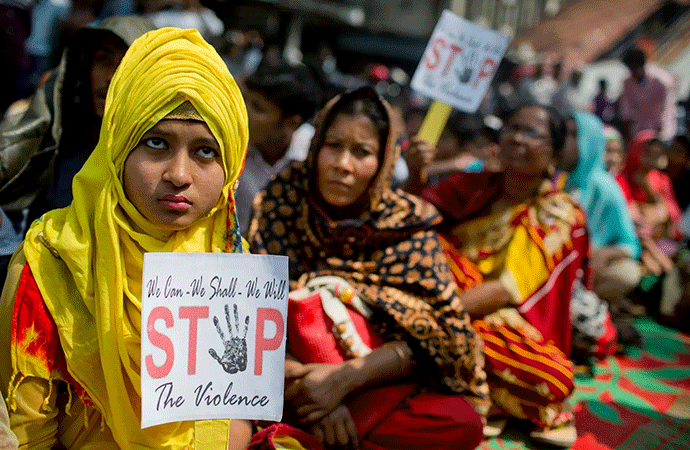Column

When I was a graduate student of History at Cambridge, my thesis supervisor, the fatherly Leslie Wayper, once recited to me a wonderful little poem, "Which is Which", by a man called John Byrom. The poem goes:
"God bless the King! God bless the faith's defender!
God bless, no harm in blessing, the Pretender.
But who pretender is, and who is king,
God bless us all, that's quite another thing."
That poem was Dr. Wayper's way of telling me to keep religious verities outside my study of History. Certainly, religion is a personal reality and a sociological fact and, in that sense, it is a historical truth as well, but the historian has no business subscribing to any religious truth as the foundation of his scholarly work. He or she is free to follow a religion in his or her personal life, but that life must not intrude into his functioning as a historian. What applies to History applies to International Relations as well.
It came to me as a surprise to discover that Dr. Wayper was a devout Christian. Long after my academic endeavours at Cambridge were over and I visited him at his village home in Norfolk, I rose up early to catch a train, only to hear him reading the Bible softly. I waited for him to finish before I climbed down a flight of stairs to meet him before my departure. Dr. Wayper left me and the rest of the world a few years after that meeting.
But his teaching will never leave me. He confirmed my belief in the secular nature of political actions, be they of statesmen or of charlatans. Religion is not a delusion, but the political use of religion to achieve human results is not only delusional but dangerous because it provokes humans to fight for what they think are eternal ends when all that they do is to squabble violently over passing means. They might well wish to do so, but the historian or the sociologist - to say nothing of the doctor or the engineer - is not supposed to act as if the "here" is the only pathway to the "hereafter". The hereafter will take care of itself: Take care of the here, and now.
Dr. Wayper came to mind when I read a Reuters news agency report last week on the succession of the Tibetan spiritual leader, the Dalai Lama. Reuters summed up the issue with customary brevity: "Ahead of celebrations this month for his 90th birthday that were attended by senior Indian ministers, the head of Tibetan Buddhists riled China again by saying it had no role in his succession. Tibetans believe the soul of any senior Buddhist monk is reincarnated after his death, but China says the Dalai Lama's succession will also have to be approved by its leaders."
The Chinese embassy in New Delhi said that the succession of the Dalai Lama was a thorn in China-India relations, even as India's foreign minister prepared to visit China for the first time since deadly border clashes in 2020. Spirituality, I imagine, was not on the top of the agenda of that visit: After all, the 2020 clashes had not been very spiritual. Soldiers were killed. Yet, the Dalai Lama, who has been living in exile in India since 1959 after an abortive uprising against Chinese rule in Tibet, featured in the embassy statement, a reminder that the spiritual can also be intensely political.
Reincarnation is the work of gods, but the reincarnated need to be reborn somewhere. There, what matter are the name of the country, the economic and political organisation of its society, and the endemic rivalry between states. The Chinese position is this: "The reincarnation and succession of the Dalai Lama is inherently an internal affair of China." That claim is quixotic given that China is an atheist state which cannot possibly believe in reincarnation. India believes otherwise, but that, too, is quixotic. A federal Indian minister, who sat next to the Dalai Lama, has said that as a practising Buddhist, "he believes only the spiritual guru and his office have the authority to decide on his reincarnation", according to Reuters. India's foreign ministry has taken the agnostic position, saying that New Delhi "does not take any position or speak on matters concerning beliefs and practices of faith and religion". That is good, but it does not quite answer China's qualms about the political presence of the Dalai Lama in India. Yet, China, too, politically hosts the Panchen Lama, second only to the Dalai Lama, whom it installed.
Let me be clear. I am deeply respectful of religion, and nothing that I have said till now should be construed as belittling the Dalai Lama and the Panchen Lama. Buddhists, whom I cherish for their commitment to non-violence, have the right to choose what to believe in. To me, neither the Dalai Lama nor the Panchen Lama is either king or pretender. They are they, Buddhists are Buddhists, and I am I.
All that I am saying is that bringing religion into politics is a matter of great concern. That is because in religion, the eternal awaits us, while in politics, the temporal chases after us. Both dimensions have their place in any life, so long as they are not confused with each other.
God bless us all. That's the thing.
The writer is Principal Research Fellow of the Cosmos Foundation. He may be reached at epaaropaar@gmail.com

























Leave a Comment
Recent Posts
Pedaling Through the Mangroves ...
The journey from the bustling streets of Barishal to the serene, emera ...
Why the Interim Government mus ...
Two weeks out from what is expected to be a red letter day in the figh ...
Doesn’t matter who thinks what about Bangladesh deci ..
The Other Lenin
US President Donald Trump said his administration
Govt moves to merge BIDA, BEZA, BEPZA, MIDA